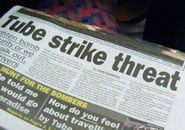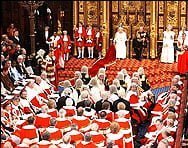
Floods, Foot and Mouth and hundreds of thousands of public
sector workers balloting for industrial action over pay, not perhaps the sort
of run up to the party conference that Gordon Brown had hoped for. But despite
all this the Labour Party is ahead in the polls bolstered by the effect of the
"Brown Bounce".
There are a few
reasons for this, not least the fact that Tony Blair was seriously discredited
particularly by the war and the fact that the Tories seem utterly incapable of
putting together a coherent opposition. John Redwood’s proposal to abolish
inheritance tax only serves to demonstrate the tensions between the "New
Tory" cyclists and the rabid right wing sections.
But can we be
confident that Labour can beat the Tories in a "snap" election, and just
as importantly is there any evidence that Brown will be more convincing to
working class voters who have stayed at home in droves in the past period?
From an economic
point of view there are some dark clouds on the horizon. The recent instability
in the financial markets reflects a much greater and more significant malaise
in the US housing market, threatening the property price boom and raising the
prospect of still higher interest rates to control credit. Despite the apparent
stability of the British economy during the Labour Government, the next period
will be markedly different and will inevitably impact dramatically on working
people.
At the same time,
constant restructuring, attacks on pensions, privatisation and financial
squeeze on the public sector are leading to a highly volatile situation. Local
government and the NHS workers are on a collision caused with the government
over pay and given the cuts in the fire service and other parts of the public
sector it is quite possible that the government could face a generalised public
sector strike movement involving two or three million workers.
Hardly a day goes by
without the news of another series of explosions in Iraq or attacks in
Afghanistan. British troops in Iraq are now restricted to two bases, one of
which they are intending to leave and the head of the army is worried about
British Forces being overstretched.
Further destabilisation
The invasion of Iraq has proven to be a complete disaster,
which could still see the break up of the country and a further destabilisation
of the Middle East. There is some evidence that Gordon Brown has tried to
distance himself from the Bush administration, but that isn’t enough. The only
way to send a clear message to Bush is complete and immediate withdrawal of
British troops. The alternative is more attrition, more atrocities and
inevitable defeat.
 The Cash for
The Cash for
Honours enquiry, while absolving the party leadership of having broken the law,
illustrated the extent to which the group around Tony Blair was reliant on rich
backers and big business. It also may explain the ongoing struggle to break the
trade union link. We need to fight to preserve Labour’s link with the unions,
and to ensure that it remains the political expression of the organised working
class. More than that, the links to big business illustrate very clearly the
need for rank and file party members and trade unionists to reclaim the party
and fight to regain democratic reforms inside it.
Inside the Labour
movement it is clear that the turn to the right that merely accelerated during
the Blair years has to a large extent run its course. The campaign around John
McDonnell’s candidature was significant in providing a pole of attraction for
many party members and trade unionists who while sick of Blair, maybe felt
isolated or disenfranchised by the party in the past. Most significantly the
big trade union leaders are being pushed kicking and screaming into opposition.
This is particularly the case with UNISON whose leadership have consistently
tried to "hold the line", often at the expense of the membership.
With ballots on the cardsin both Local Government and the NHS virtually
simultaneously that cosy relationship is under threat.
The party conference
will cheer the new leader and will no doubt be quite positive at least in terms
of the possibility that Labour can win the next election. However, despite the
stage managing of conference and the restricted character of the debates, it is
likely that some of the opposition to the current policy and programme of the
government will find its way onto the floor of conference.
To guarantee a
Labour victory, it will be insufficient to merely tinker at the edges, making
superficial changes to re-brand the party around a new leader. The crisis of reformism
reflects the crisis of capitalism.
It is clear
that the Labour movement must break with the failed big business policies of
Tony Blair and to begin to address the real problems of working people in
Britain and internationally. Only a government armed with a bold socialist
programme can resolved the problems facing working people. Such a programme –
21st Century Socialism – can only be based upon the nationalisation of the
commanding heights of the economy under workers’ control and management. Only
then can the economy be run in the interests of the working class and not – as
is the case now – in the interests of the tycoon and bankers of the City of
London.






